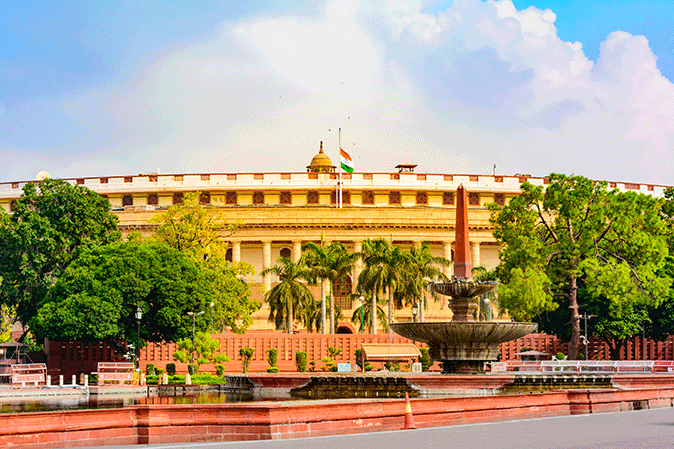Thank you!
The full article is available below.
You will also receive a follow-up email containing a link so you can come back to it later.

Bhimrao Ramji (B.R.) Ambedkar’s story is a testament to the power of resilience and the pursuit of justice. Born into the Dalit caste once deemed “untouchable,” Ambedkar rose above systemic discrimination to become one of the most influential figures in modern Indian history. His journey from social oppression to India’s first Minister of Law and Justice reshaped a nation.
Explore the life of the visionary Indian economist, political leader, jurist, and social reformer who helped give India its legal and moral compass. Journey along through his remarkable academic achievements, his pivotal role in drafting the Indian Constitution, his global perspective on social justice, and the enduring legacy he left behind.
The Scholar
For B.R. Ambedkar, education was more than a path to knowledge; it was an act of rebellion. In a society that denied his Dalit community basic human dignity, academic achievement became his primary tool for liberation.
Ambedkar was a prolific and brilliant student whose quest for knowledge took him across the world. He was the first Indian to pursue an Economics doctorate in America, receiving his Ph.D. in Economics from Columbia University in 1927 after studying under renowned thinkers like John Dewey. This experience in the United States shaped his understanding of equality and democracy. He told The New York Times that his best friends were his classmates and professors at Columbia, highlighting the profound impact this period had on his worldview.
Ambedkar also received a second doctorate from the London School of Economics as one of the first Indian students to do so. This global education gave him a unique perspective. He connected the struggle of the Dalits in India to broader fights for civil rights around the world, using his knowledge of Western political thought to critique injustice even in the very nations where he studied. This made his approach to social justice both personal and universally relevant.
The Revolutionary
Ambedkar’s fight for Dalit rights was more than just political. He challenged the very foundation of the caste system, a structure that had defined Indian society for centuries. His most explosive work on this subject was a speech he never had the opportunity to deliver.
In 1936, he wrote the Annihilation of Caste for a group of liberal Hindu reformers. However, upon reviewing the draft, they found its contents too radical to adopt. He published the work himself, and it quickly became foundational text for social justice movements across India. In it, Ambedkar methodically dismantles the religious and social justifications for caste, exposing it as a system of graded inequality designed to dehumanize and oppress.
The Framer
Following India’s independence in 1947, the nation faced the monumental task of creating a framework for its new democracy. Ambedkar was invited by Prime Minister Jawaharlal Nehru to serve as India’s first law minister on August 15, 1947. Two weeks later, he was appointed Chairman of the Drafting Committee of the Indian Constitution. This role was perhaps the most significant of his life, allowing him to embed his principles of justice, liberty, and equality into the very fabric of the nation.
Drawing on his extensive legal and social studies, Ambedkar championed provisions to protect the rights of all citizens of India, regardless of caste, creed, or gender. He was the driving force behind including fundamental rights, abolishing “untouchability,” and establishing affirmative action policies to uplift marginalized communities.
The Indian Constitution stands today as one of the most progressive in the world, and much of its spirit is a direct reflection of Ambedkar’s vision. He created a legal framework that aimed to correct historical injustices and pave the way for a more equitable future.
The Legacy: A Beacon for Global Justice
The influence of B.R. Ambedkar extends far beyond India’s borders. His life and work continue to inspire movements for civil rights and social equality worldwide. His insistence on constitutional methods, education, and social reform provides a powerful model for creating lasting change.
His legacy was acknowledged on the world stage when former U.S. President Barack Obama addressed the Indian Parliament in 2010. Obama highlighted Ambedkar’s incredible journey, stating, “Just as a Dalit like Dr. Ambedkar could lift himself up and pen the words of the constitution that protects the rights of all Indians.” This mention underscored the universal appeal of Ambedkar’s story—a story of overcoming immense barriers to become the first highly educated, politically prominent member of the Hindu “untouchable” caste.
He is best remembered today for leading colonial India’s only autonomous struggle for Dalit rights and social recognition; for his extensive writings that reprised caste as a form of inequality and historical injustice; and for his role as Chairman of the Drafting Committee of the Indian Constitution, which allowed him to leave a profound and enduring mark on Indian trajectories of democratic justice and affirmative action policy. B.R. Ambedkar’s fight for equality continues to resonate today.
Visit the BARBRI Resource Center for more information to inspire your legal learning journey.
Unlock the Full Article
Bring Your Goals Within ReachTell us a little about yourself and your goals to display the full article and gain access to more resources relevant to your needs.
Interested in reading more? Fill out the form to read the full article.